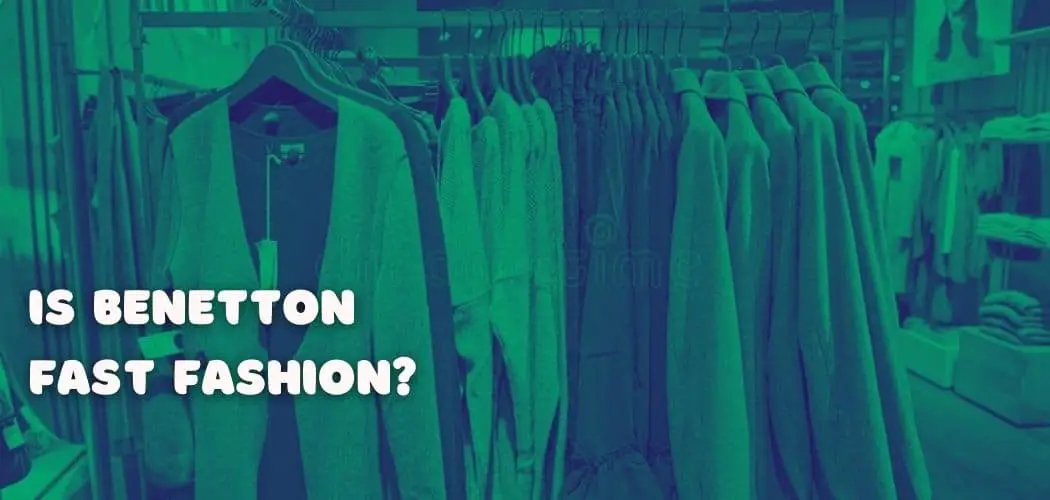Benetton is an Italian fashion company. This company has more than 5000 stores in different countries on almost all continents of the world.
But is Benetton Fast Fashion?
Is Benetton an ethical brand?
Is Benetton a sustainable/eco-friendly brand?
In this article, we have tried to answer all of the questions you might have about the ethics and policies of Benetton. Keep reading to find out!
About Benetton
Benetton is an Italian fashion brand that has stores all around the world. Benetton was founded in 1965 which means Benetton has been around for nearly 60 years.
Benetton has more than 5000 stores all around the world. Benetton has stores in 31 countries in Europe, 4 countries in Asia, and 22 countries in South America, North America, and Australia.
Bennet was very popular in the 90s, however, its popularity has decreased over time. In 2017, the company faced a loss of €180 Million.
However, Benetton got up again in 2020 and now has more than 5000 stores and has 1500 employees and 25,000 out-sourced employees.
The women’s collection of Benetton includes clothing items such as jeans, skirts, coats, shirts, dresses, swimwear, and knitwear.
Their men’s collection includes puffer jackets, knitwear, shirts, jeans, polos, swimwear, and jeans.
Benetton also has a huge variety of products for kids aged from 0 to 14 years.
Is Benetton Fast Fashion?
What Is Fast Fashion?
In the past, people used to have a few clothes but these clothes were of high quality. They used to purchase only a few clothes in a year.
However as the world is becoming global, many people buy and have various unnecessary clothes.
Statistics show that an average American woman bought 32 pieces of clothes in a year.
According to WSJ, an average American bought 68 pieces of clothing in 2018.
This is due to Fast Fashion. Fast Fashion refers to the transition of clothing trends from the catwalk and social media to clothing stores.
Many companies are using this model. Clothes made by companies that follow the model of Fast Fashion are trendy and cheap.
Companies advertise people to buy more trendy clothes and
people are getting influenced by these advertisements. One of the main factors is that these clothes are inexpensive.
This is the reason that many people are buying new, cheap and trendy clothes. However, there are some serious drawbacks of Fast Fashion;
- Fast Fashion causes environmental pollution. One piece of garment requires thousands of litres of water and tons of carbon emissions.
- Many garment workers are underpaid and are forced to work for several hours y day of the week.
- Fast Fashion is ‘Fast’. When the trend dies out, most people throw away their old and out-of-trend clothes to make room for new clothes.
Is Benetton Fast Fashion?
Benetton is in the grey area between a luxury and Fast Fashion brand. It’s neither a luxury nor a Fast Fashion brand.
Benetton is not a cheap brand. Its products are quite expensive as compared to other brands that follow the model of Fast Fashion.
For example, a simple sweatshirt for women costs more than $70. However, in other Fast Fashion companies such as Zara and H&M, women’s sweatshirts cost less than $40.
Moreover, the clothes of Benetton last longer as they use mono fibres so they can be easily used again and again.
In short, the life cycle of Benetton’s clothes is longer as compared to other Fast Fashion brands.
Is Benetton Sustainable?
On their website, Benetton mentions that;
“Our collections employ 80% natural fibres and some of our products are made out of recycled and regenerated materials. We aim to be using only sustainable cotton by 2025“.
According to Benetton, their clothes are made with techniques that reduce the environmental impact.
The stores of Benetton use renewable electricity. Benetton uses colours that are derived from natural materials such as vegetables and minerals.
Benetton is transparent when it comes to its environmental policies. It was ranked among the top ten transparent brands by Fashion Transparency Index.
However, Benetton has not mentioned anything about its carbon emission. It has also not mentioned any steps that it might have taken to reduce its carbon emission.
Hence, Benetton is not a 100% sustainable brand. However, they are much more sustainable than their other competitors.
Is Benetton Ethical?
To find out whether Benetton is ethical or not, we need to look at its environmental impacts and workers’ ethics.
Sustainability
As we discussed above, Benetton is not a 100% sustainable brand. However, they are more sustainable than most of their competitors.
Labour Ethics
Benetton works with several manufacturers from around the world.
Bennet has a code of conduct, which suppliers have to follow. On their website, Benetton mentions that;
“each Benetton supplier must adhere to our Code of Conduct, based on respect for human rights and environmental protection, and undergo periodic and unannounced inspections by internationally recognized external audit firms.”
Mostly, Benetton makes its clothes in Italy. However, it was also found that Benetton clothes are made in Bangladesh when a factory collapsed resulting in the death of several workers.
Hence, Benetton has good policies for garment workers. However, there is no evidence of whether it’s implemented or not.
Is Benetton Ethical?
From the facts that we checked about the sustainability and worker’s ethics, we can conclude that;
Benetton is not a 100% ethical company, however, it’s much better than its competitors in terms of ethics.
Benneton is an Italian based fashion company and has thousands of stores on almost all continents of the world.
Benetton lies between Fast Fashion and luxury brands as the prices of the brand are high as compared to Fast Fashion brands and low than luxury brands.
Benetton is not a completely ethical company however they are better than many of its competitors as they are taking steps to reduce its environmental impacts and also have policies for garment workers.

